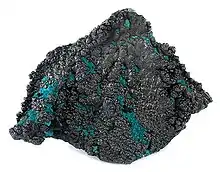Heterogenite
Heterogenite is a natural tri-valent cobalt oxyhydroxide mineral.[2] It is one of the most important cobalt resources in the world, about 70% of which is located in DR Congo.[3]
| Heterogenite | |
|---|---|
 | |
| General | |
| Category | Mineral |
| Formula (repeating unit) | CoO(OH) |
| IMA symbol | Htg[1] |
| Strunz classification | 04.FE.20 |
| Dana classification | 06.01.04.02 |
| Crystal system | Trigonal or Hexagonal |
| Identification | |
| Color | Black, reddish, blackish-brown |
| Cleavage | {0001} |
| Mohs scale hardness | 4–5 |
| Density | 4.13 – 4.47, Average = 4.3 |
| Common impurities | Mn, Ni, Zn, Cu, Fe |
The name heterogenite came from Greek, "of another kind", as the mineral differs in composition from similar minerals.[4] Its formation is likely related to the weathering of carrollite (CuCo2S4).[5] In nature it is found coexisting with other minerals like smaltite, pharmacosiderite, calcite, linnaeite, sphaerocobaltite, malachite and cuprite.[2]
References
- Warr, L.N. (2021). "IMA–CNMNC approved mineral symbols". Mineralogical Magazine. 85 (3): 291–320. Bibcode:2021MinM...85..291W. doi:10.1180/mgm.2021.43. S2CID 235729616.
- Heterogenite (PDF). Mineral Data Publishing. 2001–2005.
- "Mineral commodity summaries 2021". Mineral Commodity Summaries. 2021. doi:10.3133/mcs2021.
- "Heterogenite". mindat.org. Retrieved 2022-01-03.
- Decrée, Sophie; Pourret, Olivier; Baele, Jean-Marc (2015). "Rare earth element fractionation in heterogenite (CoOOH): implication for cobalt oxidized ore in the Katanga Copperbelt (Democratic Republic of Congo)". Journal of Geochemical Exploration. 159: 290–301. doi:10.1016/j.gexplo.2015.10.005. ISSN 0375-6742.
This article is issued from Wikipedia. The text is licensed under Creative Commons - Attribution - Sharealike. Additional terms may apply for the media files.